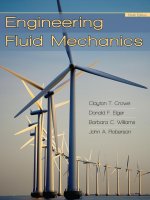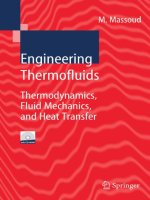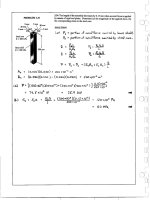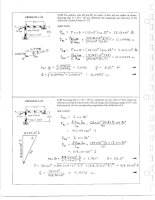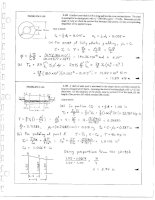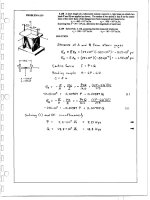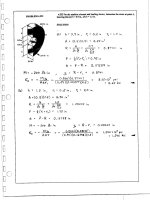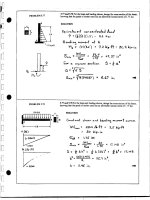engineering fluid mechanics solution manual
Bạn đang xem bản rút gọn của tài liệu. Xem và tải ngay bản đầy đủ của tài liệu tại đây (1.53 MB, 45 trang )
Prof. T.T. Al-Shemmeri
Engineering Fluid Mechanics Solution
Manual
Download free eBooks at bookboon.com
2
Engineering Fluid Mechanics Solution Manual
© 2012 Prof. T.T. Al-Shemmeri & bookboon.com (Ventus Publishing ApS)
ISBN 978-87-403-0263-9
Download free eBooks at bookboon.com
3
Engineering Fluid Mechanics Solution Manual
Contents
Contents
Book Description:
5
Author Details:
5
1
Chapter One Tutorial Problems
6
2
Chapter Two Tutorial Problems
13
3
Chapter hree Tutorial Problems
21
4
Chapter Four Tutorial Problems
28
5
Chapter Five Tutorial Problems
31
Sample Examination Paper
33
Class Test – Fluid Mechanics
34
Formulae Sheet
44
e Graduate Programme
for Engineers and Geoscientists
I joined MITAS because
I wanted real responsibili
Maersk.com/Mitas
Real work
International
Internationa
al opportunities
ree work
wo
or placements
Month 16
I was a construction
supervisor in
the North Sea
advising and
helping
foremen
he
ssolve problems
Download free eBooks at bookboon.com
4
Click on the ad to read more
Engineering Fluid Mechanics Solution Manual
Book Description
Book Description:
Title – Engineering Fluid Mechanics Solution Manual
Author – Prof. T.T. Al-Shemmeri
Fluid Mechanics is an essential subject in the study of the behaviour of luids at rest and when in motion.
he book is complimentary follow up for the book “Engineering Fluid Mechanics” also published on
BOOKBOON, presenting the solutions to tutorial problems, to help students the option to see if they
got the correct answers, and if not, where they went wrong, and change it to get the correct answers.
Author Details:
Prof Tarik Al-Shemmeri – BSc, MSc, PhD, CEng
Professor of Renewable Energy Technology at Stafordshire University.
Current research interests in Renewable Energy and Environmental Technology.
Lecturing topics include: Energy management and Power generation.
Download free eBooks at bookboon.com
5
Engineering Fluid Mechanics Solution Manual
Chapter One Tutorial Problems
1 Chapter One Tutorial Problems
1.1
Show that the kinematic viscosity has the primary dimensions of L2T-1.
Solution:
he kinematic viscosity is deined as the ratio of the dynamic viscosity by the density of the luid.
he density has units of mass (kg) divided by volume (m3); whereas the dynamic viscosity has the units
of mass (kg) per meter (m) per time (s).
Hence:
w?
1.2
o ON /3V /3
?
? N4V /3
/5
t
ON
In a luid the velocity measured at a distance of 75mm from the boundary is 1.125m/s. he luid
has absolute viscosity 0.048 Pa s and relative density 0.913. What is the velocity gradient and
shear stress at the boundary assuming a linear velocity distribution? Determine its kinematic
viscosity.
[Ans: 15 s-1, 0.72Pa.s; 5.257x10-5 m2/s]
Solution:
Download free eBooks at bookboon.com
6
Engineering Fluid Mechanics Solution Manual
Itcfkgpv ?
v ?o
w?
1.3
Chapter One Tutorial Problems
fX 30347
?
? 37 u /3
f{ 20297
fX
? 2026: z37 ? 20942 Rc0u
f{
o 2026:
?
? 70479 z32 /7 o 4 1 u
;35
t
A dead-weight tester is used to calibrate a pressure transducer by the use of known weights
placed on a piston hence pressurizing the hydraulic oil contained. If the diameter of the piston
is 10 mm, determine the required weight to create a pressure of 2 bars.
[Ans: 1.6 kg]
Solution:
(a)
P = F/A
C?
r
6
F4 ?
Hence the weight
r
6
z 20232 4 ? 90:76 z32 /7 o 4
=PxA/g
= 2 x 105 x7.854x10-5 / 9.81
= 1.60 kg
Download free eBooks at bookboon.com
7
Engineering Fluid Mechanics Solution Manual
1.4
Chapter One Tutorial Problems
How deep can a diver descend in ocean water without damaging his watch, which will withstand
an absolute pressure of 5.5 bar?
Take the density of ocean water, r = 1025 kg/m3.
[Ans: 44.75 m]
Solution:
Use the static equation: r"?"t"i"j"
Hence the depth can be calculated as:
*707 / 3+ z32 7
R
?
? 66097o Ycvgt
j?
t 0i
3247 z;0:3
1.5
he U-tube manometer shown below, prove that the diference in pressure is given by:
d 2
P1 − P2 = r .g .z 2 1 +
D
Download free eBooks at bookboon.com
8
Engineering Fluid Mechanics Solution Manual
Chapter One Tutorial Problems
Solution:
he relationship between liquid columns and the area of cross section is based on the conservation of
matter, ie continuity equation, hence:
volume 1 = volume 2
|3 zC3 ? |4 zC4
jgpeg › |3 ?
| 4 z*r 1 6+ zf 4
f
? |4 z* + 4
4
*r 1 6+ zF
F
For the “U” tube manometer that the height diferent in the two columns gives the pressure diference,
therefore:
H 3? H 4
R3 - t0i0|3 ? R4 - t0i0|4
hence
R3 / R4 ? t0i0* |4 / |3 +
? t0i0|4 z ]3 - *f 1 F +4 _
Clearly if D is very much larger than d then (d/D)2 is very small so
R3 / R4 ? t0i0|4
1.6
A lat circular plate, 1.25 m diameter is immersed in sewage water (density 1200 kg/m3) such
that its greatest and least depths are 1.50 m and 0.60 m respectively. Determine the force exerted
on one face by the water pressure,
[Ans: 15180 N]
307o"
Download free eBooks at bookboon.com
9
208o"
c"
Engineering Fluid Mechanics Solution Manual
Chapter One Tutorial Problems
Solution:
Area of laminar
C""""
3
?" r *3047+4"?"3044:"o4"
6
Depth to centroid
je""
3
?" *2082"-"3072+"?"3027"o"
4
Resultant Force
F
= r g A hc = 9.81 x 1200 x 1.228 x 1.05
= 15180 N
www.job.oticon.dk
Download free eBooks at bookboon.com
10
Click on the ad to read more
Engineering Fluid Mechanics Solution Manual
1.7
Chapter One Tutorial Problems
A rectangular block of wood, loats with one face horizontal in a luid (RD = 0.9). he wood’s
density is 750 kg/m3. Determine the percentage of the wood, which is not submerged.
[Ans: 17%]
Solution:
Ygkijv"
Y"
H"
For stable condition
Upthrust = weight force or
F=W
he Upthrust due to Buoyancy = rseawater g Vx
he total weight of submersed wood = rwood g VL
herefore the portion of block that is NOT submerged is
1- Vx/VL = (rwood / rwater ) = 1 - 750 / 900 = 17%
Download free eBooks at bookboon.com
11
Engineering Fluid Mechanics Solution Manual
1.8
Chapter One Tutorial Problems
An empty balloon and its equipment weight 50 kg, is inlated to a diameter of 6m, with a gas
of density 0.6 kg/m3. What is the maximum weight of cargo that can be lited on this balloon,
if air density is assumed constant at 1.2 kg/m3?
[Ans: 17.86 kg]
Solution:
Y"
H"
Since the system is stable according to Newton’s second law of motion:
Upthrust
= Weight force + Payload
he Upthrust is F
= r x g xVL = 1.2 x 9.81 x(px(4/3)x33) =1331.4 N
Weight of balloon gas
= r xVL = 0.6 x 9.81 x(px(4/3)x33) =666 N
Weight of equipment
= 50 kg = 50x9.81 = 490.5 N
herefore the payload that can be lited
P
=F-W
= 1331.4 – (666 + 490.5)
= 175 N = 17.9 kg.
Download free eBooks at bookboon.com
12
Engineering Fluid Mechanics Solution Manual
Chapter Two Tutorial Problems
2 Chapter Two Tutorial Problems
2.1
A 20 mm dam pipe forks, one branch being 10 mm in diameter and the other 15 mm in diameter.
If the velocity in the 10 mm pipe is 0.3 m/s and that in the 15 mm pipe is 0.6 m/s, calculate the
rate of low in cm3/s and velocity in m/s in the 20 mm diameter pipe.
(129.6 cm3/s, 0.413 m/s)
Solution:
Total mass low into the junction = Total mass low out of the junction
ρ1Q1 = ρ2Q2 + ρ3Q3
When the low is incompressible (e.g. if it is water) ρ1 = ρ2 = ρ
Q
= A2 V2 + A3 V3
= (p/4) D22x V2 + (p/4) D32x V3
= (p/4) 0.012x 0.3+ (p/4) 0.0152x 0.6
= 2.356x10-5 + 10.6x10-5
= 12.96 x10-5 m3/s
since
S ?" C3 "z"X3
^X3 ?
S
r
6
z 2024
4
? 206347 o 1 u "
Download free eBooks at bookboon.com
13
Engineering Fluid Mechanics Solution Manual
2.2
Chapter Two Tutorial Problems
Water at 36 m above sea level has a velocity of 18 m/s and a pressure of 350 kN/m2. Determine
the potential, kinetic and pressure energy of the water in metres of head. Also determine the
total head.
Ans (35.68 m, 16.5 m, 36 m, 88.2 m)
Solution:
Take each term separately
r3
572 z325
?
? 57089:o "
ti 3222 z;0:3
X34
3:4
?
? 380736o "
4i 4 z;0:3
z1 = 36m
he total head = 35.678 + 16.514 + 36 = 88.192 m
Download free eBooks at bookboon.com
14
Click on the ad to read more
Engineering Fluid Mechanics Solution Manual
2.3
Chapter Two Tutorial Problems
he air supply to an engine on a test bed passes down a 180 mm diameter pipe itted with an
oriice plate 90 mm diameter. he pressure drop across the oriice is 80 mm of parain. he
coeicient of discharge of the oriice is 0.62 and the densities of air and parain are 1.2 kg/m3
and 830 kg/m3 respectively. Calculate the mass low rate of air to the engine.
Ans (0.16 kg/s)
Solution:
(i)
p1 - p2 = rm x g x h
= 830 x 9.81 x 0.080 = 651 Pa
4* r3 / r4 +
4 z87306
""" ?
? 56025 o 1 u
4
304 z]3 / *;2 1 3:2+ 6 _
t ]3 / * C4 1 C3 + _
(ii)
x4 ?
(iii)
m = Cd V2 A2 x r
C4 ?
Q
r
6
z202;4 ? 8058 z32/5 o4
= 0.62 x 34.03 x 0.00636 x 1.2
= 0.161 kg/s
Download free eBooks at bookboon.com
15
Engineering Fluid Mechanics Solution Manual
2.4
Chapter Two Tutorial Problems
Determine the pressure loss in a 100 m long, 10 mm diameter smooth pipe if the low velocity
is 1 m/s for:
a) air whose density 1.0 kg/m3 and dynamic viscosity 1 x 10-5 Ns/m2.
b) water whose density 10003 kg/m3 and dynamic viscosity 1 x 10-3 Ns/m2.
Ans: (320 N/m2, 158 kN/m2)
Solution:
a) For air
Re
= r V D/m = 1 x 1 x 0.01/ 1 x 10-5 = 1000 i.e. laminar
f = 16/Re=16/(1000)= 0.016
therefore
hf = 4 xfx
L v2
D 2g
322
34
j h ? 6 z20238 z
z
? 5408 o
2023 3;084
R ? t 0i0j h ? 302 z;0:3z5408 ? 542 P 1 o
"
4
b) for water
Re
= r V D/m
= 1000 x 1 x 0.01/ 1 x 10-3 = 104 i.e. turbulent low
f
= 0.079/Re0.25
= 0.079/(104)0.25 = 0.0079
therefore
hf = 4 xfx
L v2
D 2g
322
34
jh ? 6 z20229; z
z
? 3803 o
2023 3;084
R ? t 0i0j h ? 3222 z;0:3z3803 ? 379;63 ? 37: mP 1 o4
Download free eBooks at bookboon.com
16
Engineering Fluid Mechanics Solution Manual
2.5
Chapter Two Tutorial Problems
Determine the input power to an electric motor (hm = 90%) supplying a pump (hp = 90%)
delivering 50 l/s of water (r = 1000 kg/m3, m = 0.001 kg/ms) between two tanks with a diference
in elevation of 50m if the pipeline length is 100m long in total of 150 mm diameter, assume a
friction factor of 0.008 and neglect minor losses.
Ans: (33.6 kW)
Solution:
V = Q/A = 0.05/(p x 0.152/4) = 2.83 m/s
Re = rVD/m = 1000 x 2.83 x 0.15/0.001 = 4.244 x 105
k/D = 0.15/150 = 0.001;
From Moody diagram f = 0.0051
6 h N x 4 6 z 2022:z322 40:54
jh ?
?
? :092: o "
z
F 4i
2037
4 z ;0:3
hsys = Hf + Hz + Ho = 8.708 + 50 + 0 = 58.808 m
Input power R ?
t0i0S0J u{u 3222 z ;0:3z 2027z 7:092:
?
? 550773 mY "
j oj r
20; z 20;
Join the Vestas
Graduate Programme
Experience the Forces of Wind
and kick-start your career
As one of the world leaders in wind power solutions with wind turbine installations in over 65
countries and more than 20,000 employees
globally, Vestas looks to accelerate innovation
through the development of our employees’ skills
and talents. Our goal is to reduce CO2 emissions
dramatically and ensure a sustainable world for
future generations.
Read more about the Vestas Graduate
Programme on vestas.com/jobs.
Application period will open March 1 2012.
Download free eBooks at bookboon.com
17
Click on the ad to read more
Engineering Fluid Mechanics Solution Manual
2.6
Chapter Two Tutorial Problems
A jet of water strikes a stationary lat plate “perpendicularly”, if the jet diameter is 7.5 cm and
its velocity upon impact is 30 m/s, determine the magnitude and direction of the resultant force
on the plate, neglect frictional efect and take water density as 1000 kg.m3.
Ans (3970 N)
Solution:
C?
r
6
F4 ?
r
6
z 20297 4 ? 6063: z32 /5 o 4
Hz ? tCX 4 *3 / equs +
Hz ? 3222 z 6063: z32 /5 z 52 4 z *3 / 2+
Hz ? 5;98 P
Download free eBooks at bookboon.com
18
Engineering Fluid Mechanics Solution Manual
2.7
Chapter Two Tutorial Problems
A horizontally laid pipe carrying water has a sudden contraction in diameter from 0.4m to 0.2m
respectively. he pressure across the reducer reads 300 kPa and 200 kPa respectively when the
low rate is 0.5 m3/s. Determine the force exerted on the section due to the low, assuming that
friction losses are negligible.
Ans: (25.5 kN)
Solution:
C3 ?
C4 ?
r
6
r
6
z 206 4 ? 203478 o 4
z 204 4 ? 202536 o 4
S
20 7
?
? 50;9; o 1 u
r
C3
4
z 206
6
20 7
S
x4 ?
?
? 370;37 o 1 u
r
C4
z 204 4
6
x 3?
/Hz"-"r3C3"/"r4"C4"equ"s"?"t" X% "*X4"equ"s"/X3+"
"
/Hz"-""522z325z203478"Î"422z325z202536z3?"3222z207z*370;37/50;9;+
"
/"Hz"-"""598:2""""/"84:5?7;8:""
Hence
Fx = 25429 N
Download free eBooks at bookboon.com
19
Engineering Fluid Mechanics Solution Manual
2.8
Chapter Two Tutorial Problems
A siphon has a uniform circular bore of 75 mm diameter and consists of a bent pipe with its crest
1.8 m above water level and a discharge to the atmosphere at a level 3.6 m below water level.
Find the velocity of low, the discharge and the absolute pressure at crest level if the atmospheric
pressure is 98.1 kN/m2. Neglect losses due to friction.
Ans (0.0371 m3/s, 45.1 kN/m2)
Solution:
4
4
r
r3 x3
x5
- |3 ? 5 - |5
ti 4i
ti 4i
2 - 2 - 508 ? 2 -
4
x5
-2
4i
jgpeg › X5 ? 4 z ;0:3z 508 ? :0626 o 1 u
"
r 4
r
4
5
"S ? CzX ? 6 F zX ? 6 z 20297 z :0626 ? 20259 o 1 u
5
r
;:
" 03z32
- 2 ? 4 - 706
" z ;0:3
ti
3222
^"R4 ? ;:03z32 5 / 706 z ;:32 ? 67348 Rc
Download free eBooks at bookboon.com
20
Engineering Fluid Mechanics Solution Manual
Chapter Three Tutorial Problems
3 Chapter Three Tutorial Problems
3.1
If the vertical component of the landing velocity of a parachute is equal to that acquired
during a free fall of 2m, ind the diameter of the open parachute (hollow hemisphere) if
the total weight of parachute and the person is 950N. Assume for air at ambient conditions,
Density = 1.2 kg/m3 and Cd = 1.35
Ans (6.169m)
Solution:
"
In Paris or Online
International programs taught by professors and professionals from all over the world
BBA in Global Business
MBA in International Management / International Marketing
DBA in International Business / International Management
MA in International Education
MA in Cross-Cultural Communication
MA in Foreign Languages
Innovative – Practical – Flexible – Affordable
Visit: www.HorizonsUniversity.org
Write:
Call: 01.42.77.20.66
www.HorizonsUniversity.org
Download free eBooks at bookboon.com
21
Click on the ad to read more
Engineering Fluid Mechanics Solution Manual
4
Chapter Three Tutorial Problems
4
X4 ? X3 - 4cu
X ? 4 z ;0:3z 4 ? 80486 o 1 u
PUN <
ÂH ? 2
o0i /
3
t0X 4 0Ch zEf ? 2
4
;72 /
r
3
z304 z 80486 40* +F 4 z306 ? 2
4
6
uqnxg › F ? 8039 o
3.2
A buoy is attached to a weight resting on the seabed; the buoy is spherical with radius of 0.2m
and the density of sea water is 1020 kg/m3. Determine the minimum weight required to keep
the buoy aloat just above the water surface. Assume the buoy and the chain has a combined
weight of 1.2 kg.
Ans (33 kg)
Solution:
Download free eBooks at bookboon.com
22
Engineering Fluid Mechanics Solution Manual
Chapter Three Tutorial Problems
Since the system is stable and motionless, Newton’s second law of motion reduces to:
Weight = Upthrust (Buoyancy)
Fb = Fg
Volume of sphere
= (4.pi/3) x R3 = 0.0335 m3
he Upthrust is FB
= rluid x VL x g =1020 x 0.0335x9.81= 335.3 N
Weight
= 9.81 x(1.2 + Load )
Hence the payload
= (335.3 / 9.81) – 1.2 = 32.98 kg
3.3
An aeroplane weighing 65 kN, has a wing area of 27.5 m2 and a drag coeicient (based on wing
area) CD=0.02+0.061 xCL2. Assume for air at ambient conditions, Density = 0.96 kg/m3. Determine
the following when the crat is cruising at 700 km/h:
1. the lit coeicient
2. the drag coeicient, and
3. the power to propel the crat.
Ans (0.13, 0.021, 2040 kW)
Solution:
HN
87 z32 5
EN ?
?
*3 1 4+t0C0X 4 *3 1 4+z 20;8 z 4907 zX 4
E F ? 2024 - 20283zE N
4
Ç
87z32 5
? 2024 - 20283z È
4 Ù
É *3 1 4+z 20;8 z 4907 zX Ú
4
hence
HF ?
3
3
t0X 4 0Ch zE F ? z 20;8 zX 4 z 4907z*2024 - 3609; z32 7 zX / 6 +
4
4
Download free eBooks at bookboon.com
23
Engineering Fluid Mechanics Solution Manual
Chapter Three Tutorial Problems
Power
R ? HF zX ? 20486X 5 - 30;74 z32 9 X /3
X ? 922 mo 1 j ?
922 z3222
? 3;60666 o 1 u
5822
hence
E N ? 3609; z32 7 z*3;60666+ / 6 ? 2035
E F ? 2024 - 20283z 2035 4 ? 20243
R ? 20486 z3;60666 5 - 30;74 z32 9 1 3;60666 ? 4263 mY
3.4
A racing car shown below is itted with an inverted NACA2415 aerofoil with lit to drag given
as:
Cd=0.01 + 0.008 x Cl2
he aerofoil surface area is 1 m2 and the car weight is 1 kN; the car maintains a constant speed
of 40 m/s, determine at this speed:
1. he aerodynamic drag force on the aerofoil
2. he power required to overcome this drag force
Are you remarkable?
Win one of the six full
tuition scholarships for
International MBA or
MSc in Management
Download free eBooks at bookboon.com
24
register
now
rode
www.Nyen
ge.com
n
le
MasterChal

